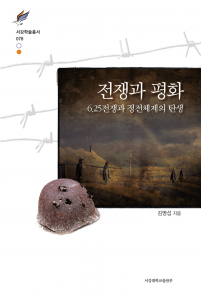2017 ICAS Book Prize in Korean : Book Talk Series 3

- Date & Time: Friday, 9 November, 14:00-16:00
- Location: Room #303, SNUAC(Bldg#101)
- Inquiry: Nahyun Lee / +82-2-880-2868 / julianalee@snu.ac.kr
About
 Shortlisted for IBP 2017 Korean Language Edition
Shortlisted for IBP 2017 Korean Language Edition
[War and Peace: The Birth of the Korean Armistice Regime in 1953], Myongsob Kim, Sogang University Press, 2015.
Author : Myongsob Kim
● Professor, Dept. of Political Science and Int’l Studies, Yonsei University
● Director, Syngmanrhee Research Center, Yonsei University
● Editorial Board, Geopolitics
This book examines the Korean War and the following armistice regime in the peninsula with a historico-political framework, substantiating the analysis with materials that were made available at the end of the Cold War. Rather than focusing on the outbreak or the development of the war itself, this book explores how a sustaining regime was established and became fixed in place through the war, how to understand and analyze the regime, and what implications the regime has for the present. The merits of this book are numerous. The author makes good use of a wide range of historical materials, traces the development of the terms and concepts related to the Korean War and the armistice negotiation process, and provides a rich history of this line of research for the benefit of future researchers. The author argues that the Korean War and the resulting features of the armistice regime have been derived mainly from the clash between different “idea-chains.” The Korean War and the armistice regime are understood to have originated from clashes between civilizations (communism vs. democracy and capitalism; containment of the Japanese right-wing totalitarianism) and ideological conflicts (Joseon nationalism vs. Korean nationalism), both based upon political ideology at large. This approach, however, seems to exclude other things behind the Korean War: the history and structure of the war, domestic and international factors surrounding the Korean peninsula, and the complicated relations amongst them. The author makes another argument that the Korean War became a key historical event through which the global-scale cold war regime was turned into the regional-scale armistice regime in East Asia. Yet, to prove the claim, he needs to deal with the Korean War in more detail, and relate his study to other issues outside of the Korean peninsula.
